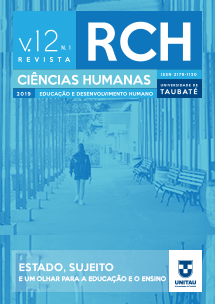AVALIAÇÃO DA METODOLOGIA THEOPRAX PARA A FORMAÇÃO PROFISSIONALIZANTE NO SENAI-BAHIA
DOI:
https://doi.org/10.32813/rchv12n12019artigo7Abstract
A necessidade de constantes inovações em produtos, processos e sistemas de gestão tem sido determinante na busca por profissionais adequadamente formados. Essa busca leva ao questionamento do ensino técnico tradicional e do seu papel de desenvolver aptidões para o mundo do trabalho na atualidade. Na tentativa de preencher lacunas na formação profissionalizante, têm surgido metodologias que tentam sintonizar o ensino técnico tradicional com as novas demandas. Uma delas é a metodologia alemã TheoPrax, focada no desenvolvimento de habilidades comportamentais praticadas em projetos realizados pelos alunos em empresas, sob orientação e acompanhamento de docentes. Uma avaliação preliminar dessa metodologia – a qual vem sendo adotada em unidades do ensino técnico do SENAI da Bahia - aferiu a contribuição da mesma para o desenvolvimento das habilidades comportamentais dos alunos na execução de projetos de trabalho no ambiente industrial local. A referida avaliação foi feita sob tripla perspectiva: (a) dos próprios alunos egressos; (b) dos docentes; e (c) das empresas onde os alunos atuaram. Este trabalho permitiu um olhar crítico sobre a metodologia TheoPrax no SENAI da Bahia, ensejando sugestões de ajustes na execução e monitoramento dos projetos, com vistas ao aprimoramento da aprendizagem de habilidades comportamentais dos discentes que fazem emprego daquela metodologia.Metrics
Downloads
Additional Files
Published
How to Cite
Issue
Section
License
The publications of the Human Sciences Journal are registered under the Creative Commons Attribution CC-BY license.
1. The contents of the manuscripts are the exclusive responsibility of their author.
2. It is allowed the total or partial reproduction of manuscripts published in the journal, provided that the source is cited.
3. When submitting their manuscript to the Journal, the authors certify that they are of their own authorship and unpublished (not published in any digital or printed media).
4. The copyright of the articles published in the Journal are of the author, with first publication rights reserved for this journal.
5. For disclosure purposes, the Journal may replicate the works published in this journal in other media, such as social networks (Facebook, Academia.Edu, etc.).
6. The Journal is of public access, therefore, the authors who submit manuscripts agree that they are of free use.
7. In case of any illegality, fraud, or other attitude that puts in doubt the honesty of the publication, especially the practice of plagiarism, the manuscript will be automatically rejected.
8. If the manuscript has already been published, it will be immediately removed from the base of the Journal, its citation linked to the Journal will be prohibited and the cancellation of the referred publication shall be reported in the next issue of the one in which the article was published. In case of the procedure for the withdrawal of the paper the authors will be informed beforehand, being guaranteed the right to a broad defense.
9. The personal data provided by the authors will be used exclusively for the services provided by this publication and will not be made available for other purposes or to third parties.





